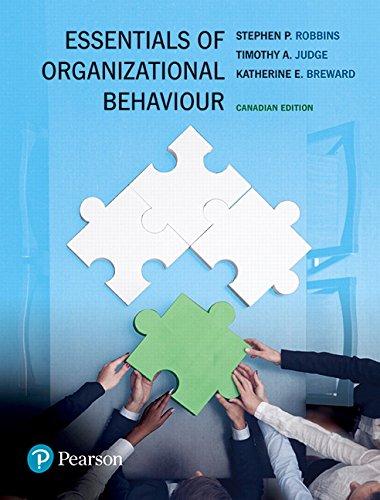Rodrigo took a moment to swallow some of his irritation and annoyance before responding to his boss
Question:
Rodrigo took a moment to swallow some of his irritation and annoyance before responding to his boss and company CEO, John. He looked around the meeting table and saw nothing but downcast eyes and uncomfortable fidgeting, so he knew he was on his own. “What do you expect people to say,” he asked John wearily. “After a display like that do you really think anyone will talk?”
John had called a meeting with all of his supervisors, managers, and his executive team, including Rodrigo. They all worked for a firm that made a high-end line of gourmet salsas. The salsas were sold in specialty shops and small, privately owned grocery shops. The company had started off well eight years ago, seeing slow but steady growth for the first five years.
The past three years had been characterized by new competitors and diminished profits.
During those difficult years each and every employee had made concessions to help the struggling company. For example, the production staff (responsible for turning fresh vegetables into canned salsas) hadn’t had any raise at all, even a cost-of-living increase, for three years. Given that they were unionized and had the power to initiate a strike over wages, this had been a significant concession on the union’s part. The executive team had also gone without raises and bonuses.
Now, however, things were looking up. Six months ago their signature salsa had been featured on the Food Network as a key ingredient in a well-known cooking competition. That had led to a deal with a major grocery chain to carry their line of products. Sales had skyrocketed, profits were up, and it was time to share the wealth. That’s why they were all meeting, to discuss the best way to distribute the benefits of their newfound success.
At the beginning of the meeting, John had presented financial figures and asked his team what they thought should be done for the employees. He mentioned that he had his own ideas but wanted to hear what others thought. Few spoke up, so John proposed a 3 percent raise for everyone across the board. “Wait a minute,” said Rodrigo. “Remember that these people haven’t had cost-of-living increases in three years. Every one of them sacrificed to help this company during lean times. They all know that we’ve done very well lately and that this new contract is a game changer. I think that, under the circumstances, offering only 3 percent might be considered condescending or insulting. In a way this is really four years’ worth of raises we are talking about. Frankly, 3 percent just sucks.”
There was silence for a few seconds. Then the outburst began. “What do you mean it sucks?” bellowed John. “You should all be on board with this suggestion since it came from management. Aren’t you a team player? I don’t like your attitude.” The rant continued for about two-and-a-half minutes, after which John asked, “Does anyone else feel the same as Rodrigo”? It was this request for additional feedback that had led to Rodrigo to say, “What do you expect people to say? After a display like that do you really think anyone will talk?”
Discussion Questions
1. List and explain all the communication errors you can in this scenario.
2. What communication barriers and/or perceptual biases may have contributing to John’s overreaction to Rodrigo’s comments? How might these have been avoided? Remember to consider what Rodrigo might have done differently and what John might have done differently.
3. What might John do now, after this event, to create an environment conducive to effective upward communication?
Step by Step Answer:

Essentials Of Organizational Behaviour
ISBN: 9780134182971
1st Canadian Edition
Authors: Stephen P. Robbins, Timothy A. Judge, Katherine Breward





